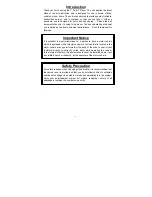
Preparations
16
Operating instructions for the natural gas-fuelled CHP module
VITOBLOC 200
6130329
GB
2.1.4
Heating water
Quality regulations for hot water in conformity
with VDI Guideline 2035
The current edition of the
manufacturer’s data and
VDI Guideline 2035
(Guidelines for Preventing Dam-
age from Corrosion and Stone Formation in Warm
Water Heating Plants) are definitive for the quality of the
hot water.
The chloride content should not be in excess of 30 mg/l
and the quality of the heating water should satisfy the
requirements of VDI 2035.
VDI 2035 makes requirements of the quality of the hot
water depending upon the overall heating output and
specific plant content.
CAUTION
You can calculate the specific plant vol-
ume in several heat generators with the
smallest single heat performance (see
VDI 2035 for greater detail).
total heating perfor-
mance
total hardness
total hardness
total hardness
in KW
in °dH
at <20 l/kW
minimum boiler heating
surface
in °dH
at >20 l/kW <50 l/kW mini-
mum boiler heating surface
in °dH
at >50 l/kW
minimum boiler heating
surface
<50 kW
no requirements or
<16.8°dH
11.2°dH
0.11°dH
>50 kW <200 kW
11.2°dH
8.4°dH
0.11°dH
>200 kw <600 kW
8.4°dH
0.11°dH
0.11°dH
>600 kW
0.11°dH
0.11°dH
0.11°dH
Table 7 Quality characteristic values for the filling and supplemental water for heating plants with Vitobloc 200 CHP modules
CAUTION
The mud separator provided by the cus-
tomer should be cleaned every half year.
Preventing corrosion
Corrosion in heating plants can essentially be attributed
to the presence of oxygen in the hot water. Therefore,
the probability of damage from corrosion in metallic
materials is low in hot water which is low in oxygen.
Possible sources of oxygen input are:
●
low-pressure formation in the heating system
●
air inclusion with filling and supplemental water
●
oxygen input through the heating water coming
directly into contact with air (an open system)
●
oxygen diffusion via permeable components such
as seals, plastic pipes, membranes and hoses
●
the oxygen content of the filling and supplemental
water
●
expansion tank for boilers that are too small
Chemical additives to the heating water
There is normally not any corrosion in warm water
heaters that are correctly designed, installed and oper-
ated. This is why additives can generally be dispensed
with.
CAUTION
Do not use any chemical additives in the
heating water without obtaining a clear-
ance certificate from the manufacturer of
the chemicals with reference to the de-
sign of the heating plant and materials
used.
















































